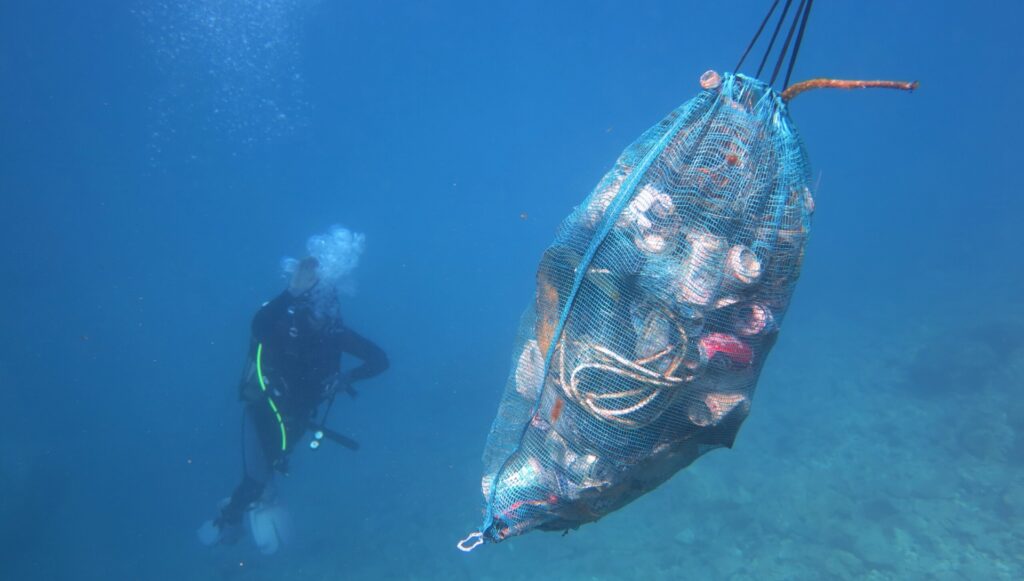SAVE THE EARTH AND HAVE FUN: ECO-DIVING
Have you ever wondered how divers can make a difference in ocean conservation? Volunteers around the world are making significant eco-friendly efforts to save the earth. From organizing community cleanups to planting trees and restoring natural habitats… Dedicated individuals around the world are actively working to reduce pollution, conserve biodiversity, and combat climate change. Their initiatives are often grassroots and locally driven. Trying to inspire sustainable practices and raise awareness about environmental issues, and why? They are trying to save the world, by demonstrating that collective action can lead to meaningful change for a healthier and more sustainable future. At Britain’s first eco-dive center, Fifth Point Diving, passionate divers are not only exploring the depths of the North Sea but also actively working to clean it up. This article takes you beneath the waves to discover how eco-friendly initiatives are transforming diving into a mission to save our seas.
Eco-Diving in the North Sea
Fifth Point Diving, co-founded by Nic Emery, has made history as the first dive shop in Britain to be officially recognized as an eco-center by the Professional Association of Diving Instructors (PADI). Located in Whitley Bay, just over 10 miles from Newcastle, this dive center is pioneering efforts to clean up the North Sea while fostering a community of environmentally conscious divers.

Divers removing marine debris to save the earth
Central to these efforts is the “Dive Against Debris” certification, which is open to divers of all levels. The program teaches participants how to identify, safely remove, and log marine debris they encounter on the seabed during their dives. As Nic Emery explains, “Seventy percent of all marine debris sinks to the bottom of the ocean, so divers are best placed to survey sites to paint a picture of common waste issues which could influence local management plans.” This initiative not only aids in cleaning the oceans, but also contributes valuable data that can be used to inform local environmental policies.
The impact of these eco-diving efforts extends beyond Fifth Point Diving. Local businesses like Aquanorth and Stellar Divers are also incorporating eco-friendly practices into their diving programs. Aquanorth, based in South Shields, now includes Dives Against Debris as part of every underwater session. And last year alone, they removed tonnes of marine debris from the waters around the Farne Islands. Similarly, Stellar Divers in Lincoln has integrated environmental conservation into its training programs. Both centers are working towards PADI eco-center certifications.
The Rise of Eco-Diving
One step forward to save the earth, the eco-diving movement in the North Sea draws inspiration from the region’s rich maritime history. Particularly the story of Grace Darling is quite a legacy. She became a national heroine in 1838 when she bravely encountered a violent storm to rescue survivors of a shipwreck off the Northumberland coast. Today, divers are the modern-day champions of these waters. But instead of saving lives, they are focused on saving the sea itself.

Grace Darling and Her Father Rescuing Survivors from the Wreck of the “Forfarshire” on the Farne Islands by Charles Achille D’Hardiviller
Beyond participating in Dive Against Debris sessions, eco-divers are encouraged to adopt a range of sustainable practices. These include honing their buoyancy skills to avoid accidentally damaging marine flora, using dive gear made from recycled ocean plastic, and supporting marine charities such as the Tynemouth Seal Hospital. These practices are designed to minimize the environmental impact of diving and promote long-term conservation efforts.
The Future of Ocean Conservation
The success of eco-diving initiatives in the UK is inspiring a broader movement within the diving community. As more dive centers like Aquanorth and Stellar Divers adopt eco-friendly practices, there is growing momentum towards making environmental conservation a standard part of dive training. Aquanorth, for example, runs Seal Awareness courses led by marine biologists. They educate divers on the ecological importance of seals and how to interact responsibly with these animals. This education is crucial for fostering a deeper understanding of marine ecosystems and the challenges they face.
Looking ahead, the goal is to expand these initiatives and encourage more dive centers worldwide to adopt similar practices. By integrating conservation efforts into diving, the hope is to significantly reduce the amount of marine debris. Eventually, it will promote healthier and more sustainable ocean environments. This collaboration between divers and marine biologists points to a future where diving is not just about exploration. It can be about making a tangible positive impact on the planet.
What Can I Do To Save The Earth?
Fifth Point Diving and other eco-dive centers are leading the charge in transforming diving into a force for good. By participating in eco-diving activities, divers can help protect marine ecosystems while enjoying the beauty of the underwater world. Interested in joining the movement? Sign up for a Dive Against Debris course and start making a difference today!
